最新人教版最新版新目标八年级英语下册单元知识点归纳资料
英语人教版新目标八年级下册知识整理Unit5

【英语】八年级下册教材全梳理(Unit5 If you go to the party you’ll have a great time)知识·巧学生词巧解【词析】音析:字母组合ea读作[]。
义析:a kind of trousers【典句】This pair of jeans is in style.这条牛仔裤很时髦。
【拓展】jeans本身是复数名词,作主语时谓语动词要用复数形式。
take away拿走【词析】形析:take(拿)+away(离开)义析:take sth.from one place to another【典句】Don’t forget to take away your umbrella.别忘了带走你的雨伞。
【拓展】away是副词,当宾语为代词宾格时,一定要放在away的前面。
make a living 谋生【词析】形析:make(做)+a(一种)+living(生活)义析:do sth.for a living【典句】He makes a living as a writer.他靠写作维持生计。
【拓展】使用时,如果说明谋生的手段应在living后加介词by+doing的结构,指“以……为生”。
如:He makes a living by selling books.他以卖书为生。
【词析】音析:a读[],ai读作[e],重音在第二个音节上。
形析:again(又;再次)+st义析:in a direction or course opposite to【典句】We boated against the wind.我们逆风行船。
【拓展】against本身是介词,不能单独作谓语,常和系动词be连用,意为“反对”。
【词析】音析:ch读作[],an读作[],词尾的e不发音。
形析:形近词change(选择)义析:something that happen unusually and luckily【典句】I haven’t had a chance to read my letter.我还没有机会看我的信呢。
新人教版|八年级下册英语所有知识点大汇总
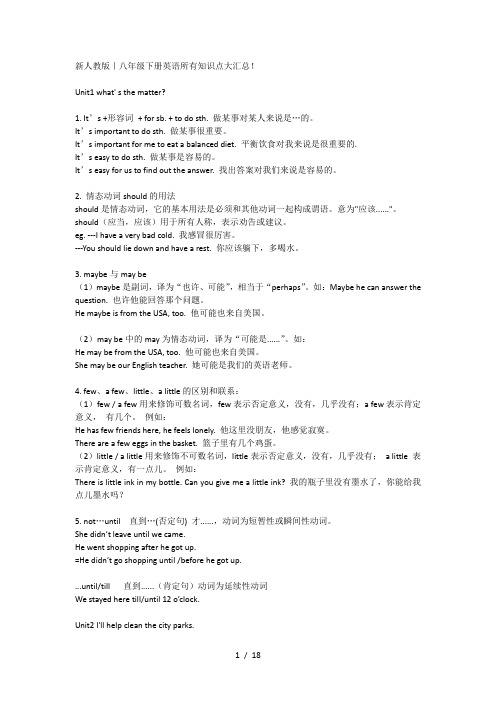
新人教版|八年级下册英语所有知识点大汇总!Unit1 what' s the matter?1. It’s +形容词+ for sb. + to do sth. 做某事对某人来说是…的。
It’s important to do sth. 做某事很重要。
It’s important for me to eat a balanced diet. 平衡饮食对我来说是很重要的.It’s easy to do sth. 做某事是容易的。
It’s easy for us to find out the answer. 找出答案对我们来说是容易的。
2. 情态动词should的用法should是情态动词,它的基本用法是必须和其他动词一起构成谓语。
意为"应该......"。
should(应当,应该)用于所有人称,表示劝告或建议。
eg. ---I have a very bad cold. 我感冒很厉害。
---You should lie down and have a rest. 你应该躺下,多喝水。
3. maybe与may be(1)maybe是副词,译为“也许、可能”,相当于“perhaps”。
如:Maybe he can answer the question. 也许他能回答那个问题。
He maybe is from the USA, too. 他可能也来自美国。
(2)may be中的may为情态动词,译为“可能是......”。
如:He may be from the USA, too. 他可能也来自美国。
She may be our English teacher. 她可能是我们的英语老师。
4. few、a few、little、a little的区别和联系:(1)few / a few用来修饰可数名词,few表示否定意义,没有,几乎没有;a few表示肯定意义,有几个。
例如:He has few friends here, he feels lonely. 他这里没朋友,他感觉寂寞。
人教版初中英语八年级下册全册各单元知识点、语法归纳整理
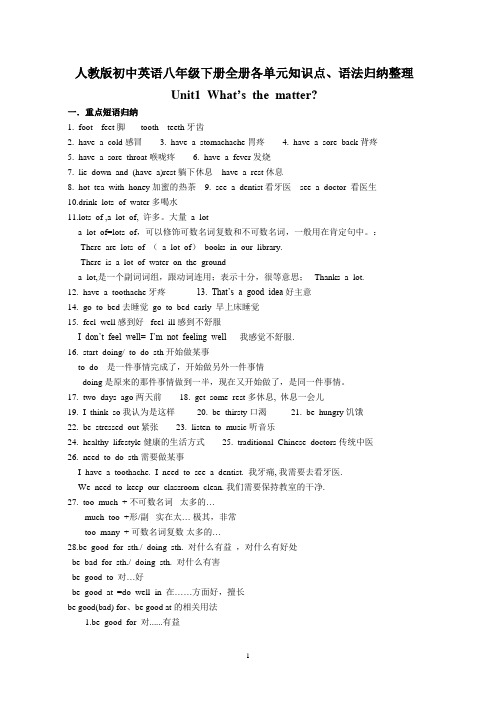
人教版初中英语八年级下册全册各单元知识点、语法归纳整理Unit1 W hat’s the matter?一.重点短语归纳1. foot---feet 脚tooth---teeth 牙齿2. have a cold 感冒3. have a stomachache 胃疼4. have a sore back背疼5. have a sore throat喉咙疼6. have a fever发烧7. lie down and (have a)rest 躺下休息have a rest 休息8. hot tea with honey 加蜜的热茶9. see a dentist 看牙医see a doctor 看医生10.drink lots of water多喝水11.lots of ,a lot of, 许多。
大量a lota lot of=lots of,可以修饰可数名词复数和不可数名词,一般用在肯定句中。
:There are lots of (a lot of)books in our library.There is a lot of water on the grounda lot,是一个副词词组,跟动词连用;表示十分,很等意思;Thanks a lot.12. have a toothache牙疼13. That’s a good idea好主意14. go to bed 去睡觉go to bed early 早上床睡觉15. feel well感到好 feel ill 感到不舒服I don’t feel well= I’m not feeling well我感觉不舒服.16. start doing/ to do sth开始做某事to do 是一件事情完成了,开始做另外一件事情doing是原来的那件事情做到一半,现在又开始做了,是同一件事情。
17. two days ago两天前18. get some rest 多休息, 休息一会儿19. I think so我认为是这样20. be thirsty口渴21. be hungry 饥饿22. be stressed out紧张23. listen to music听音乐24. healthy lifestyle健康的生活方式25. traditional Chinese doctors传统中医26. need to do sth 需要做某事I have a toothache. I need to see a dentist. 我牙痛, 我需要去看牙医.We need to keep our classroom clean. 我们需要保持教室的干净.27. too much + 不可数名词太多的…much too +形/副实在太…极其,非常too many + 可数名词复数太多的…28.be good for sth./ doing sth. 对什么有益,对什么有好处be bad for sth./ doing sth. 对什么有害be good to 对…好be good at =do well in 在……方面好,擅长be good(bad) for、be good at的相关用法1.be good for 对......有益Doing morning exercises is good for your health.做早操对你们的建康有益。
人教新目标八年级下各单元知识点整理

人教新目标八年级下期末复习知识点整理Unit 1 Will people have robots?1.形容词,副词的比较等级考查热点透视:a) 表示A与B在程度上相同时,“as+形容词或副词的原级+as”结构。
表示A不如B时,可用“not as/so+形容词或副词的原级+as”结构。
b) 表示A比B在程度上“更…..”时,可用“形容词或副词的比较级+than”结构c) 表示三者或三者以上的比较,其中一个在程度上“最…..”时,常用“the+形容词或副词的最高级”结构,后面可带“of/in的短语”来说明比较的范围。
(注意:副词的最高级在句中常省略“the”.)d) 在形容词或副词的比较级前,可以用“a little, even, far, much,still”的等词语来修饰,以加强语气。
e) 表示“越来越….”时,常用“形容词或副词的比较级+and+形容词或副词的比较级”结构,但要注意,对于多音节和部分双音节形容词,副词而言,若要表达此意时,要用“more and more+形容词或副词的原级“结构。
f) 在表示“其中最….之一“的含义时,常使用“one of+the+形容词最高级形式+名词复数”结构,其中的定冠词the不可以省略。
g) 如果强调“两者中比较…的(一个)”的意思时,可使用“the+形容词比较级+其它”结构。
h) 表示“越….越….”, 可使用“the+形容词或副词的比较级,the+形容词或副词的比较级”结构。
2 .一般将来时a) 一般将来时的构成:由助动词shall或will加动词原形构成,shall用于第一人称。
在口语中,will在名词或代词后常简略为’ll,will not常简略为won’t。
这个时态的肯定,否定和疑问结构可表示如下:用”be going to +动词原形”也可表示将来时,表示将要发生的事,打算或决定要做的事。
b)一般将来时的用法:1)表示将要发生的动作或情况;2)不以人的意志为转移,肯定要发生的事情。
英语人教版新目标八年级下册知识整理Unit4

【英语】八年级||下册教材全梳理(Unit4 He said I was hard -working )知识·巧学生词巧解【词析】音析:元音字母a读[].形析:形近词sad(忧愁的;悲哀的)义析:angry and crazy【典句】He was mad with joy.他欣喜假设狂.【拓展】固定搭配:be mad at/with =be angry with/at 生……的气【词析】音析:元音字母a发[e],ore在词尾读作[].形析:any(任何) +more(更多)义析:any longer,from now on【典句】He doesn ,t come here anymore.他再也不到这儿来了.【拓展】可构成not...anymore词组,也可写成no more .表达"不再〞的词组还有not...any longer/no longer,no more 和no longer用于句末.【辨析】not...anymore/no more与not...any longer/no longernot...anymore/no more指做某事次数不再增加,多与瞬间动词连用;not...any longer/no longer指时间上不再延续,多与持续性动词连用.first of all 首||先【词析】形析:first(第|一) +of +all(所有)义析:at first,the beginning【典句】First of all,you should think,and then speak.你应该先考虑,后开口.【拓展】first of all的同义词为at first,反义词为at last,in the end,finally等.【词析】音析:元音字母e发[e],a发[I].形析:mess(混乱) +age(年龄)义析:information,news sent to sb.in writing or speech【典句】Will you take this message to your brother?把这个便条捎给你哥哥好吗?【拓展】与message有关的词组有:give sb. a message 给……传个口信take a message for sb. 为……捎个口信leave a message 留言pass on 传递【词析】义析:take sth.to different places【典句】Let us now pass on to the next subject.现在让我们看看下一个题目.【拓展】后接宾语时可以构成pass on sth. to sb./pass on sb. sth.,当宾语为代词时只能用前一种.【词析】音析:重读开音节词,u读作[],元音字母o发本音[].形析:sup(超) +pose(姿态)义析:think about sth.that is not real now【典句】Let ,s suppose (that) the news is true.让我们假定这消息是真的 .【拓展】固定搭配:be supposed to被期望或被要求do well in 在……方面做得好【典句】I do well in drawing.我擅长画画.【拓展】be good at 相当于do well in,意思为"擅长……〞.be good at 的比较级||为be better at,do well in 的比较级||为do better in .be in good health 身体健康【词析】形析:be +in(在……状态下) +good(好的) +health(健康)义析:keep healthy,keep fit【典句】I hope you are in good health.我希望你身体健康.【拓展】表示身体健康的其他短语有:be healthy 健康的stay/keep healthy 保持健康【词析】形析:er读作[],ou读作[].形析:nerv(e)(神经的) + -ous(形容词后缀)义析:not relaxed,not comfortable【典句】I felt very nervous when I went into his office.当我走进他的办公室时,我感到很紧张.【拓展】固定搭配:be nervous about对……感到紧张【词析】音析:重读闭音节词,字母u读作[],i和y读作[I].形析:lucky(幸运的)变y为i + -ly(副词后缀)义析:fortunately【典句】Luckily,the police came right away.很幸运,警察马上就来了.【拓展】1)同根词:luck n.运气;lucky adj.幸运的2)反义词:unluckily【词析】音析:元音字母u读作[],词尾的e不发音.形析:形近词blue(蓝色)义析:right,not against【典句】Is it true that you are rich?你很富有是真的吗?【拓展】同根词:truth n.真理;truly adv.真实地【词析】音析:ow读作[].形析:形近词town(城镇)义析:belong to oneself【典句】She makes her own clothes.她自己做衣服.【拓展】own作为形容词意为"自己的〞,常用在表示所有格的词后起强调作用.作为动词意为"拥有〞,名词为owner(主人) .轻轻告诉你Every heart has its own sorrow.各人有各人的苦恼.get over 克服;恢复;原谅【词析】形析:get(得到) +over(在上面)义析:recover,forgive sb.【典句】Can we get over this difficulty?我们能克服这个困难吗?【拓展】与get有关的词组有:get to 到达get on 上车get off 下车get ready for 为……作准备get up 起床【词析】音析:第|一个a读作[],第二个a读作[I] .义析:person who finish the study in a college【典句】Two thirds of the graduates find jobs.三分之二的毕业生找到了工作.【拓展】作为动词意为"毕业〞可构成graduate from "毕业于……〞.【词析】音析:闭音节词,字母i读作\I\] .形析:形近词than(比)义析:not dense or concentrated【典句】The air there is very thin.那里的空气很稀薄.【拓展】作"稀薄的〞讲时反义词为thick,作"瘦的〞讲时反义词为fat .【词析】音析:字母e和i均读作[I],sion读作[].形析:deci(de)(决定) +sion(名词后缀)义析:something you must make a choice at one time【典句】She could not make a decision about the dresses.她对(买不买)这衣服下不了决心.【拓展】make a decision to do sth. =decide to do sth.(决定做某事)【词析】音析:ar读作[].形析:star(星星) +t义析:begin【典句】If you are ready,you may start your work.如果你准备好了,你可以开始工作了.【拓展】start作为动词"开始〞时与begin同义,其后可接动名词或动词不定式.【辨析】begin与start一般情况下,这两个词都可接动名词或动词不定式,二者用法相同.以下两种情况下只能用start,而不用begin .1)当机器"开动、发动〞时.2)作为"旅途〞开始时.care for 照顾,照料【词析】形析:care(关心) +for(为了……)义析:take care of,look after【典句】The boy is too young to care for himself.这个男孩太小,不能照顾自己.【词析】音析:元音字母a发本音[eI],字母组合er发[].形析:d +anger (愤怒)义析:risk;a source or an instance of risk or peril【典句】In war,life is full of danger for everyone.在战争中,每个人的生活都充满了危险.【拓展】1)与danger有关的词组有:in danger 在危险中out of danger 出险;脱险2)danger的形容词形式:dangerous例句精讲Section ALana thinks she ,s coming to my house to study.拉娜以为她要到我家来学习.【巧解句构】这是一个含有宾语从句的主从复合句,主句为一般现在时态,从句是用趋向性动词come的现在分词表将来.【拓展延伸】宾语从句的时态必须与主句照应:当主句中谓语是现在或将来时态,从句谓语不受主句谓语时态的影响,可以按需要使用任何时态,例如:She says that she has never been to Mount Tai.1)当主句谓语为过去时态,从句中的时态一般为过去的某种时态.例如:He said he had finished his homework.2)当从句表达的是某一客观真理(事实)时,主句无论是何种时态,从句那么用一般现在时.例如:He said that light travels much faster than sound.误区警示假设宾语从句跟在动词think,believe,suppose,expect等表示"要,认为〞等的动词后时,句子的否认表达在主句上,这就是"否认转移〞现象.例如:I don ,t think you are right.我认为你不正确.I don ,t believe he has finished his work.我相信他还没有完成他的工作.Section B 3a1.I was sorry to hear that he had a cold last week.我听说他上周感冒了觉得很难过.【巧解句构】这是一句包含宾语从句的主从复合句.主句是过去时态,从句也用过去时态.本句中that变为了宾语从句he had a cold last week的引导词.【要点剖析】I was sorry to hear that...是表示遗憾的常用语,意为"我听到……很遗憾〞.have a cold意为"患感冒〞还可以写成catch a cold .类似的词组还有:have a cough 咳嗽have a fever 发烧have a headache 头疼2.I had a really hard time with science this semester,and I wasn ,t surprised to find that my worst report was from my science(科学)teacher.这学期我的科学课学得确实很吃力,所以当我看到最||糟糕的评价来自于科学课老师时,我毫不吃惊.【巧解句构】这是一句由and连接的并列句.前一个分句是简单句,后一个分句是包含宾语从句的主从复合句,主句I wasn ,t surprised to find "我毫不吃惊地发现……〞,不定式的动词find后面带一个由that引导的宾语从句.【要点剖析】词组have a hard time with sth.意为"应付某事很费力〞;be surprised to意为"对……感到吃惊〞,不定式后接动词的原形.surprised为形容词,surprise为名词构成to one ,s surprise(使……惊奇的是)词组.【辨析比较】surprised 和surprising1)当人作主语或修饰与人有关的词时用以ed结尾的形容词.2)当物作主语或修饰与物有关的词时用以ing结尾的形容词.例如:We are surprised to hear the surprising news.我们听到那条令人惊讶的新闻感到非常吃惊.3.The good news is that my math teacher said I was hard -working.好消息是数学老师说我很用功 .【巧解句构】这是一句包含表语从句的主从复合句 .主句the good news is使用的是一般现在时,表示目前的情况.由that引导的从句my math teacher said I was hard working在句中充当表语,使用的是一般过去时,陈述过去.其中又包含一个从句I was hard working,作said的宾语.【拓展延伸】表语从句于主句中的系动词之后,主要有四类:1)由连词who,what,which 等引导的表语从句.这些词不但可以起连接作用,还可以在句中作主语、宾语和表语.例如:China is not what she was yesterday.中|国已不再是以前的那个中|国了.2)由不充当任何句子成分的连词that,whether引起的表语从句.例如:What I mean is that we should help each other.我的意思是我们应该互相帮助.The problem is whether we can finish the work on time.问题是我们能不能按时完成工作.3)由连接副词when,where,why,how 引导的表语从句 .例如:This is when I really get to know Americans.我这时才开始认识美|国人.4)由连词as,because,as if,as though 引导的表语从句.例如:It looks as if it is going to rain tonight.看起来好似今晚要下雨.Self Check 2Last week in school we had a big fight,and she didn ,t talk to me.上周在学校我们大吵了一架,她不和我说话了 .【巧解句构】这是一个and连接的前后均是一般过去时态的并列句.【要点剖析】1)短语have a fight意为"吵架〞,后面接宾语时要加上介词with,即have a fight with等同于fight with sb.(此时的fight为动词) .2)短语talk to sb.意为"与……谈话/交谈〞,to也可以被with替换 .如果talk后面接的是"某事〞那么介词用about即talk about sth. .She said helping others changed her life.1.Teaching high school students in a poor mountain village in Gansu Province may not sound like fun to you.在甘肃省一个贫困山村教中学生,在你听来也许并不有趣 .【巧解句构】该句是个简单句.这句话的主语很长,一个动名词短语(teaching high school students "教中学生〞)加上两个地点状语(in a poor mountain village "贫困山村〞和in Gansu Province "甘肃省〞)构成了本句的主语.谓语局部那么使用了sound like短语,表示"听来并不有趣〞.【要点剖析】短语sound like 意为"听起来像……〞,sound是一个系动词,类似的词还有:feel,smell,taste,look,get,turn等.2.She said that both she and her husband thought this was a good idea.她和她丈夫都认为这是一件很好的事.【巧解句构】该句是个复合句,said后面的that引导的是宾语从句,是said的内容;句中的thought后面也是一个宾语从句,但省略了引导词that .通常宾语从句由that引导时,常可省去that,但said后的that常保存.【要点剖析】词组both...and...意为"(两者)都〞是并列连词可以连接两个人或物一起作主语.反义词为neither...nor...,它们的用法不同:neither...nor...引导的词作主语时谓语动词与nor 后的词保持一致即就近原那么;both...and...无此用法 .3.There is no difference between you and them.你和他们之间没有不同.【巧解句构】该句是一个there be句型,名词difference作句子的真正主语,no相当于not any .There is no difference between...and...意为"在……和……之间没有区别〞 .如果表示"有区别〞,那么使用There is a difference between...and...或者There are differencesbetween...and... .【要点剖析】词组between...and...表示"在……之间〞,between只用于二者之间.【拓展延伸】there be句型的一些用法:1)主谓一致谓语动词要采取就近一致原那么,和靠近be的主语一致.例如:There is a pen,two rulers in the box.盒子里有一只钢笔,两把尺子.There are two boys and a teacher at the school gate.门口有两个男孩,一个老师.2)主语后的动词形式在there be 句型中,主语与动词是主动关系时用现在分词;是被动关系时用过去分词.例如: There is a purse lying on the ground.地上有一个钱包.There are five minutes left now.现在还有5分钟.3)反意疑问句反意疑问句应与there be对应,而不是依据主语.例如:There is a radio on the table,isn ,t there?桌子上有一台收音机,是吧?There are more than fifty classes in your school,aren ,t there?你们学校有50个班,是吧?4)there be 与have的替换there be表示所属时可与have替换.There is nothing but a book in my bag. =I have nothing but a book in my bag.在我包里只有一本书.记忆要诀there be 句型的谓语歌诀there be句型可译"有〞,be 动词跟着名词走.名词单数不可数,当用is记清楚.如果名词是复数,用are一定要记住.出现并列主语特殊记, "就近原那么〞用仔细.4.I can open up my students , eyes to the outside world and give them a good start in life.我能为我的学生翻开眼界看外面的世|界,并且给他们的生活一个好的开始 .【巧解句构】该句是一个含有情态动词的一般现在时态的简单句,and连接前后两个并列谓语.【要点剖析】1)短语open up one ,s eyes 意为"使……开眼界〞.2)动词give有两种用法:give sb. sth.和give sth. to sb. .5.When her year was over,she said that she would return to the area after finishing her studies.一年期满时她说:毕业后她会回到这个地方.【巧解句构】该句是个包含时间状语从句和宾语从句的主从复合句.时间状语从句when her year was over意为"当她的一年(支教)期结束时……〞.主句是一个间接引语,that...studies作said的宾语从句,时态为过去将来时,说明是在"当时〞要离开的时候,杨蕾承诺"将来〞要回到这个地方;在这个宾语从句中after finishing her studies作为一个时间状语,点明了她将要回来的时间为"完成学业后〞.【要点剖析】1)短语be over意为"结束〞.2)return to...意为"返回……〞.语法解读直接引语和间接引语引述或转述别人的话称为"引语〞.直接引用别人的原话,两边用引号"〞标出,叫做直接引语;用自己的语言转述别人的话,不需要引号,叫做间接引语,实际上间接引语大都是宾语从句,其中由祈使句转换的间接引语除外,其转换后是不定式.那么直接引语为陈述句、一般疑问句、特殊疑问句和祈使句,转换为间接引语时,句子的结构,人称、时态、时间状语和地点状语等都要有变化,如何变化呢?一、人称的转变下面有一句顺口溜"一随主,二随宾,第三人称不更新〞可以帮助我们记忆."一随主〞是指在直接引语变间接引语时,如果从句中的主语是第|一人称或被第|一人称所修饰,从句中的人称要按照主句中主语的人称变化.例如:He said, "I am very happy.〞He said that he was very happy."二随宾〞是指直接引语变间接引语时,假设从句中的主语及宾语是第二人称或被第二人称所修饰,从句中的人称要跟引号外的主句的宾语一致.如果引号外的主句没有宾语,也可以用第|一人称,例如:She said to her son, "I ,ll check your homework tonight.〞She said to her son that she would check his homework that night."You should be more careful next time,〞my grandfather said.My grandfather said that I should be more careful the next time."第三人称不更新〞是指直接引语变间接引语时,如果从句中的主语及宾语是第三人称或被第三人称所修饰,从句中的人称一般不需要变化.例如:Mr.Smith said, "Jack is a good student.〞→ Mr.Smith said Jack was a good student.总之,人称的转换不是固定的,具体情况、具体对待,要符合逻辑.二、时态的转换直接引语改为间接引语时,主句中的谓语动词如果是过去时,从句(即间接引语局部)的谓语动词在时态方面要作相应的变化,变成过去时范畴的各种时态(实际也是宾语从句的时态要求),变化如下:一般现在时→一般过去时现在进行时→过去进行时现在完成时→过去完成时一般将来时→过去将来时一般过去时→过去完成时过去完成时→不变过去进行时→不变例如:1. "I am very glad to visit the Great Wall ,〞she said.→She said she was very glad to visit the Great Wall.2.Jim said, "We are listening to the music.〞→Jim said that they were listening to the music.3.Mother asked, "Have you finished your homework before nine o ,clock?〞→Mother asked me whether I had finished my homework before nine o ,clock.4.He asked the policeman, "Where shall I find the nearest bookshop?〞→He asked the policeman where he would find the nearest bookshop.5. "Why did she go there?〞the teacher asked.→The teacher asked why she had gone there.6.Mother asked me, "Had you finished your homework before supper?〞→Mother asked me whether I had finished my homework before supper.7.Tom said, "We were having a football match this time yesterday.〞→Tom said that they were having a football match that time the day before.三、结构的转换1.陈述句.用连词that引导,that在口语中常省略.主句的谓语动词可用直接引语中的said,也可用told来代替,注意,可以说said that,said to sb. that,told sb. that,不可直接说told that .例如:He said, "I have been to the West Lake.〞He said to us that he had been to the West Lake.He said, "I ,ll give you an exam next week.〞He told us that he would give us an exam the next week.(不可说told that)此外主句中的谓语还常用repeat,answer,reply,explain,think等.例如:He said, "I ,m late because of the heavy snow.〞He explained to us that he was late because of the heavy snow.2.直接引语为一般疑问句,也称是否疑问句,间接引语用连词whether或if引导,原主句中谓语动词said要改为asked(me/him/us等),语序是陈述句的语序,这一点非常重要.例如:He said, "Do you have any difficulty with this work?〞He asked (me) whether/if I had any difficulty with this work.3.直接引语为特殊疑问句,改成间接引语时,原来的疑问词作为间接引语的连词,主句的谓语动词用ask(sb.)来表达,语序改为陈述句语序.例如:He asked me, "How many classrooms have been built in your school?〞He asked me how many classrooms had been built in our school.4.直接引语为祈使句时,改为间接引语,用带to的不定式表达,谓语动词常是ask,advise,tell,warn,order,request等.如ask sb.to do,(由肯定祈使句变成)ask sb.not to do(由否认祈使句转变),并且在不定式短语中的时间状语、地点状语、人称及时态都作相应的变化.例如:He said, "Be quiet,please.〞He asked us to be quiet."Don ,t touch anything in the lab,〞the teacher said.The teacher warned the students not to touch anything in the lab.四、时间状语和地点状语的转换在直接引语中在间接引语中指示代词this thatthose表示时间的词now thenthat daythat week(month,etc.)the day beforethe week(month,etc.)beforethree days (a year ,etc.)beforethe next (following) daythe next (following)week (month,etc.)表地点的词动词there take go但要注意在以下几种情况,直接引语变为间接引语时,时态一般不变化:1.直接引语是客观真理."The earth moves around the sun ,〞the teacher told me.→The teacher told me the earth moves around the sun.2.直接引语如果是一般现在时,表示一种反复出现或习惯性的动作.例如:He said, "I get up at seven every morning.〞→He said he gets up at seven every morning.3.如果直接引语中的情态动词没有过去时的形式(例如:had better,used to)和已经是过去时的形式时,(例如:could,should,would,might)不再变.例如:Peter said, "You had better come have today.〞→Peter said I had better go there that day.听说速递1.表达观点I think you are...我想你是……I think you are right.Thank you.I think you are good at English.I think you are lazy.I think you are hard working.2.表达问候How ,s it going?一切都顺利吗?Does everything go well?Is everything going well?How are you?Fine,thanks.Best wishes to you.3.表达遗憾I ,m sorry to hear that...我听到……很遗憾.What a pity!I ,m sorry.It ,s unfair for you.4.表达希望I hope that...我希望……I hope that you are better now.I hope you are happy.Have a good time!Have a good trip.读写指导如何写好限制性作文【点石成金】1.仔细审题,明确要求.对题目所提供的信息要认真分析,明确要求,做到心中有数.要对所提供的信息加以分析、整理,使之更加具体化、条理化,为开始动笔作好前期准备工作.还要搞清这那么题目的要求是写短文、日记、信件还是便条等,以便根据不同的题材、体裁,写出不同格式、风格各异的文章.此外,也应注意所要求的人称、时间、地点、人物等信息,防止用错.2.抓住重点,寻求思路.根据题目所提供的信息,草拟一个提纲,寻求逻辑次序,确定从何下手,再围绕这一次序,周密选词、选句,以便更加贴近主题;否那么,语无伦次的文章将不会被人接受.3.用词恰当,表达流畅.在写作过程中,万一哪个词想不起来了,千万不能空着或不写,最||好找一个同义词或用其同义句、同义词组(短语)代替.表达中不写没有把握的句子,尽可能用自己熟悉的词和句子来表达意思.表达中,尽可能采用一些简单句,并使前后句、上下文过渡自然.正确使用and,or,but,because,so等词以便使行文自然流畅,使人读后不至||于有"死水一潭〞之感觉.还应注意各种时态、语态和各种句式的交替使用,使文章显得得体、大方、错落有致.4.成文之后全面检查全文.着重看是否存在以下问题:格式、拼写、标点、扣题、不标准英文、时态、语态、主谓一致、冠词、介词、单复数、比较级||别、顺序、大小写、代词等用法错误或使用不当.【常用词汇】ever,mad,anymore,pass on,suppose,do well in,in good health,nervous,worst,lucky,hers,own,get over,meter,ate,decision,open up,start,care for,danger 【常用句型】1)What did...say?……说什么了?2)He said I could...他说我能……3)He told me he would...他告诉我他将……4)Mary said she would...玛丽说她将……5)I think you are... 我想你是……6)How ,s it going?一切都顺利吗?7)I ,m sorry to hear that... 我听到……很遗憾.8)I hope that... 我希望……9)Really?You ,re lucky.真的?你真幸运 .典题·热题例1 (2021福建福州模拟) -Do you know _________?-She came by bus.A.when she got to schoolB.why she was late for classC.how she came to school this morningD.how many times she was late for class思路解析:此题考查宾语从句的用法.主句为一般现在时态,从句可以根据表达的需要选择任何时态.根据答语可知,从句应用一般过去时态.由"by bus〞可知,对于交通工具提问只能用"how〞.答案:C误区警示此题有两处误区:一是时态,主句为一般现在时态,从句往往会误用一般现在时态;二是语序,忽略宾语从句需用陈述句语序.例2 (2021浙江杭州模拟) -Why didn ,t Alice come to the party last night?-I don ,t know _________.A.why didn ,t sheB.why she didn ,tC.why did sheD.why she did思路解析:宾语从句应用陈述句语序,故A、C项错,由题意可知,是"我不知道她为什么不来〞应用否认句,故D项错.答案:B例3 (2021湖北黄冈模拟) -Can you see ___________?-No,let ,s go and have a look.Maybe we can help them.A.what was happening thereB.what are they doing thereC.what are they talking aboutD.what is happening there思路解析:此题考查的是宾语从句的用法.当问及"你能看见……〞时,可知事情正在进行,因此应该用现在进行时态,故A不对.宾语从句应按陈述句语序排列,故B、C两项不对.D项中的what作主语,故D项是正确的.答案:D例4 (2021南通模拟) When you are sleeping,you had better _______ all your windows closed.,t keep B.not keepC.not to keepD.not keeping思路解析:此题考查had better的用法 .had better无论是用在肯定句还是在否认句中,后面都只能接动词原形.因此,C、D项均错.而had better的否认形式为had better not,故A错.答案:B误区警示better为形容词good和副词well的比较级||,这使人常常会想起"be +adj. +to do〞这种结构,会误以为had better to do sth.是正确搭配,从而错选C项 .深化升华记牢"had better(not) +动词原形〞这种结构.例5 (2021南京模拟)Susan is always the best in different exams in our class because she is a ___________ girl.-working思路解析:此题考查词的用法.此句意为"苏珊在我们班的不同的考试中总是最||好的〞,而helpful意为"有帮助的〞,polite意为"有礼貌的〞proud意为"自豪的〞,hard -working意为"努力的〞,只有hard -working与题意相符.答案:D误区警示多数形容词都可作定语修饰名词,如果不能理解词义,很容易出现误选.深化升华多动口,多动手,勤读读,多练练,掌握词的音、形、义就一路畅通了.例6 完形填空(2021河北模拟)Big schoolbags have been a serious problem for students for a long time.Maybe your schoolbags is too 1 to carry,and it troubles you a lot 2 you want to find a book out to read.Now an e -textbook will 3 you.It is said that e -textbooks are going to be 4in Chinese middle schools.An e -textbook,in fact,is a small 5 for students.It is much 6 than a usual schoolbag and easy to carry.Though it is as small as a book,it can 7all the materials(材料) for study.The students can read the text page by page on the 8,take notes with the pointer(屏写笔),or even "9〞their homework to their teachers by sending e mails.All they have to do is to press a button.Some people say e -textbooks are good,but some say they may be 10for thestudents , eyes.What do you think of it?D.understandD.practice9.A.find out B.hand inC.get backD.give back思路分析:此题为完形填空题,是模拟必考题之一也是一道综合题.应从四方面入手:1.认真阅读短文,从句意词义入手,选择适当的词填空.2.从词的用法入手,看考查的是哪个词,它有什么用法.3.从固定搭配入手,包括介词的用法.4.从时态入手,根据时态的不同选用不同的动词形式 .在正确理解句意的前提下,抓住关键句,找到突破口.运用学过的词,词组或语法对空下"药〞.希望能在不断的练习中提高自己的综合语言运用能力,提高自身的素质.答案:1~5 BDCAD6~10 BACBD深化升华1.由"Big schoolbags have been a serious problem for students for a long time.〞可以判断出.2.由句意可知此句为"当你想找出一本书来读时,他会麻烦很多〞因此只能由when来引导时间状语从句.3.由句意可知"现在一本e -textbook将帮助你〞.4.比照各选项的词义可判断出,这里指"被使用〞.5.通读全文我们可以知道既可以用屏写笔在上写也可以读,可以判断出只能是台电脑.6.因为本文是对学生们的书包越来越重深表担忧,因此e textbook肯定更轻,因此lighter 符合题意.意为"保持,保存〞,build意为"建筑,建造〞,discover意为"发现〞,practice意为"练习,实践〞.根据词义只有hold符合题意.8.这是一种电子书因此只能有screen(荧屏) .9.根据选项的词义以及句意只有hand in(上交)与作业有关.表转折,因此前面说好(good)后面一定与此相反(bad) .例7任务型阅读(2021福建福州模拟)。
(完整版)最新人教版八年级下册英语全册知识点大全

最新人教版八年级下册英语全册知识点大全Unit 1重点短语:have a stomachache have a cold lie downtake one’s temperature have a fever go to a doctorto one’s surprise agree to (do sth.)get into troublebe used to take risks run out (of)cut off get out of be in control ofkeep on ( doing sth.)give up语言知识归纳:1. What’s the matter (w ith you)?此句用来询问别人的病情。
类似的句子还有:What’s wrong with you?/ What’s the trouble?matter作动词用,意为“要紧”“有关系”,主要用于疑问句和否定句。
What does it matter? It doesn’t matter.【例题】Does it ________ if we can’t finish it today?A. mindB. mindsC. matterD. matters2. I have a sore throat.have “患病”,常用“have a /an+ 名词”.have a cold have a fever have a sore backhave a stomachache have a cough【例题】( )---Does he often have ______ cold? ---Yes. He also _____a cough and a sore throat.A. a; hasB. /; hasC. a; haveD. /; have3.Lie down and rest! 躺下休息lie down 躺下4.That’s probably why. 那可能就是原因。
最全面人教版八年级下册英语各单元知识点总复习归纳总结

最全面人教版八年级下册英语各单元知识点总复习归纳总结Unit 1 How often do you exercise?词汇1. frequently 经常地2. hardly 几乎不3. ever 曾经4. once in a while 时不时5. rarely 很少语法一般现在时1. 频率副词放在动词前:I always read newspapers.2. 否定句用don't或doesn't+动词原形:I don't watch TV every day.3. 疑问句用do或does+主语+动词原形:Do you play soccer every week?Unit 2 I used to be afraid of the dark.词汇1. used to 过去常常2. get over 克服3. nervous 紧张的4. confident 有信心的5. stage 舞台语法1. Be used to+动名词表示惯或适应,I am used to studying English at night.2. Used to+动词原形表示过去常常,I used to read books every day.3. Get over+名词/代词/动名词,表示克服,She got over the flu last week.Unit 3 Could you please tell me where the restaurants are?词汇1. instruction 说明2. turn right/left 向右/左转3. excuse me 对不起4. straight 直走5. opposite 对面语法1. Could you please/could/may I+动词原形,请求礼貌地做事,Could you please help me with my English?2. Would like+名词 / 动名词,表示想要做某事,I would like to go shopping with you.3. May I ask+句子,礼貌地询问某事,May I ask where the restroom is?Unit 4 Why don't you talk to your parents?词汇1. conversation 对话2. listener 听众3. honest 诚实的4. conversation starter 聊天开场白5. effective 有效的语法1. How about/What about+动名词/名词,表示建议和提议,What about watching a movie?2. Why not+动词原形,表示建议和提议,Why not go swimming?3. Let's+动词原形,表示建议和提议,Let's have a party on the weekend.Unit 5 It must belong to Carla.词汇1. sweater 毛衣2. by accident 偶然地3. honest 诚实的4. lose 丢失5. owner 拥有者语法1. Can/Can't+动词原形,表示能力或可能性,I can dance.2. Must/Mustn't+动词原形,表示肯定或否定的推断,She must be the new teacher.3. Have/Has to+动词原形,表示必须做的事情,I have to finish my homework first.词汇1. graduate 毕业生2. physics 物理学3. ambitious 有抱负的4. career 职业5. education 教育语法一般将来时1. be going to+动词原形,表示打算做某事,I am going to see a film tonight.3. be + going to+现在进行时,表示不久会发生的事情,They are going to sing a song later.Unit 7 How do you make a banana milk shake?词汇1. recipe 食谱2. whip 打(奶油)3. peel 去皮4. slice 切片5. pour 倒语法1. What/How/Which+系动词+主语+谓语,表示特定的主语或具体的内容。
人教版(新目标)初中英语八年级下册Unit 1
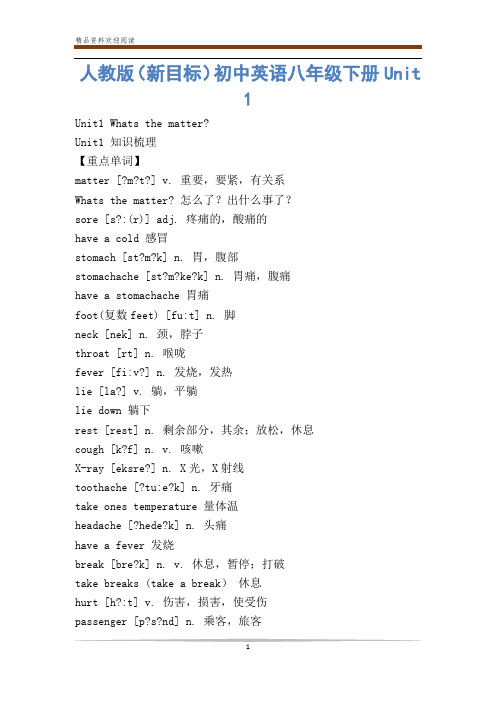
人教版(新目标)初中英语八年级下册Unit1Unit1 Whats the matter?Unit1 知识梳理【重点单词】matter [?m?t?] v. 重要,要紧,有关系Whats the matter? 怎么了?出什么事了?sore [s?:(r)] adj. 疼痛的,酸痛的have a cold 感冒stomach [st?m?k] n. 胃,腹部stomachache [st?m?ke?k] n. 胃痛,腹痛have a stomachache 胃痛foot(复数feet) [fu:t] n. 脚neck [nek] n. 颈,脖子throat [rt] n. 喉咙fever [fi:v?] n. 发烧,发热lie [la?] v. 躺,平躺lie down 躺下rest [rest] n. 剩余部分,其余;放松,休息cough [k?f] n. v. 咳嗽X-ray [eksre?] n. X光,X射线toothache [?tu:e?k] n. 牙痛take ones temperature 量体温headache [?hede?k] n. 头痛have a fever 发烧break [bre?k] n. v. 休息,暂停;打破take breaks (take a break)休息hurt [h?:t] v. 伤害,损害,使受伤passenger [p?s?nd] n. 乘客,旅客off [?f] adv. prep. 离开(某处);从去掉get off 下车to ones surprise 使惊讶,出乎意料onto [nt?] prep. 向,朝trouble [?tr?bl] n. 麻烦,烦扰,问题hit [hit] n. v. 碰撞,打,打击right away 立即,马上get into 陷入,参与herself [h?:?self] pron. 她自己,她本身(she的反身代词)bandage [b?nd?d?] n. v. 绷带;用绷带包扎sick [s?k] adj. 患病的,不适的knee [ni:] n. 膝盖nosebleed [?nzbli:d] n. 鼻出血breathe [bri:e] v. 呼吸sunburned [?s?nb?:nd] adj. 晒伤的ourselves [ɑ:?selvz] pron. 我们自己(we的反身代词)climber [?kla?m?(r)] n. 登山者be used to 习惯于适应于risk [r?sk] n. v. 风险,危险;冒险take risks (take a risk) 冒险accident [ksid?nt] n. 意外事件;事故situation [?sitju?ein] n. 状况,形式,情况kg=kilogram [?k?l?gr?m] n. 公斤,千克rock [r?k] n. 岩石run out (of) 用尽,耗尽knife [naif] n. 刀,餐刀cut off 切除blood [bl?d] n. 血mean [mi:n] v. 意味着,意思是,意欲get out of 离开,从出来importance [?m?p?:tns] n. 重要性decision [d?sn] n. 决心,决定,抉择control [k?ntrl] v. 控制,支配,操纵be in control of 掌管,管理spirit [sp?r?t] n. 勇气,意志death [de] n. 死亡give up 放弃nurse [n?:s] n. 护士【重点短语】1.have a fever 发烧2.have a cough 咳嗽3.have a toothache 牙疼4.talk too much 说得太多5.drink enough water 喝足够的水6.have a cold 受凉;感冒7.have a stomachache 胃疼8.have a sore back 背疼9.have a sore throat 喉咙痛10. take risks 冒险11.hot tea with honey 加蜂蜜的热茶12.see a dentist 看牙医13.get an X-ray 拍X 光片14.take one s temperature 量体温15.put some medicine on sth. 在上面敷药16. give up 放弃17. sound like 听起来像18. all weekend 整个周末19. in the same way 以同样的方式20. go to a doctor 看医生21. go along 沿着走22. on the side of the road 在马路边23. shout for help 大声呼救24. without thinking twice 没有多想25. get off 下车26. have a heart problem 有心脏病27. to one s surprise 另某人惊讶的是28. thanks to 多亏了;由于29. in time 及时30. make a decision 做出决定31. get into trouble 造成麻烦32. right away 立刻;马上33. because of 由于34. get out of 离开;从出来35. keep on doing sth. 继续或坚持做某事36. put a bandage on sth. 用绷带包扎37. fall down 摔倒38. feel sick 感到恶心39. have a nosebleed 流鼻血40. cut his knee 割伤他的膝盖41. put her head back 把她的头向后仰42. have problems breathing 呼吸困难43. mountain climbing 登山运动44. be used to doing sth. 习惯做某事45. run out (of) 用完;用尽46. so that 以便47. so...that... 如此以至于...48. be in control of 掌管;管理49. in a difficult situation 在闲境中【重点句型】1. Whats the matter with you?= Whatthe trouble with you?= Whats wrong with you? 你怎么了?2. What should she do? 她该怎么办呢?3.Should I take my temperature? 我应该量一下体温吗?4.You should lie down and rest. 你应该躺下休息一会儿。
人教版八年级下册各单元英语语法解析知识重点总结
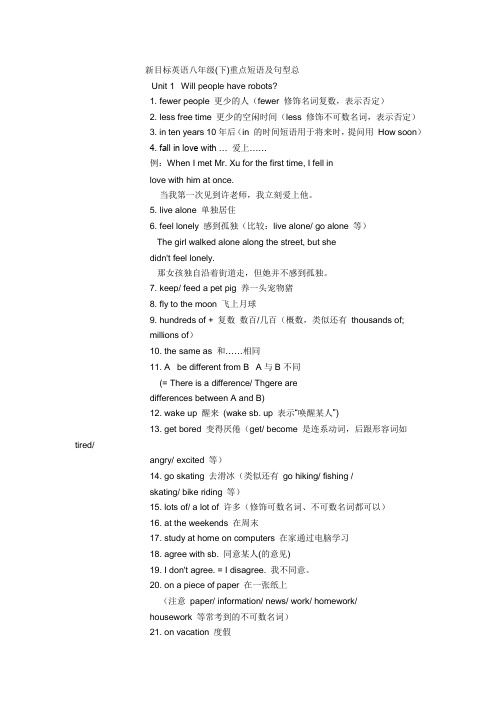
新目标英语八年级(下)重点短语及句型总Unit 1 Will people have robots?1. fewer people 更少的人(fewer 修饰名词复数,表示否定)2. less free time 更少的空闲时间(less 修饰不可数名词,表示否定)3. in ten years 10年后(in 的时间短语用于将来时,提问用How soon)4. fall in love with … 爱上……例:When I met Mr. Xu for the first time, I fell inlove with him at once.当我第一次见到许老师,我立刻爱上他。
5. live alone 单独居住6. feel lonely 感到孤独(比较:live alone/ go alone 等)The girl walked alone along the street, but shedidn't feel lonely.那女孩独自沿着街道走,但她并不感到孤独。
7. keep/ feed a pet pig 养一头宠物猪8. fly to the moon 飞上月球9. hundreds of + 复数数百/几百(概数,类似还有thousands of;millions of)10. the same as 和……相同11. A be different from B A与B不同(= There is a difference/ Thgere aredifferences between A and B)12. wake up 醒来(wake sb. up 表示“唤醒某人”)13. get bored 变得厌倦(get/ become 是连系动词,后跟形容词如tired/angry/ excited 等)14. go skating 去滑冰(类似还有go hiking/ fishing /skating/ bike riding 等)15. lots of/ a lot of 许多(修饰可数名词、不可数名词都可以)16. at the weekends 在周末17. study at home on computers 在家通过电脑学习18. agree with sb. 同意某人(的意见)19. I don't agree. = I disagree. 我不同意。
人教版八年级下册英语知识点总结(最新最全)
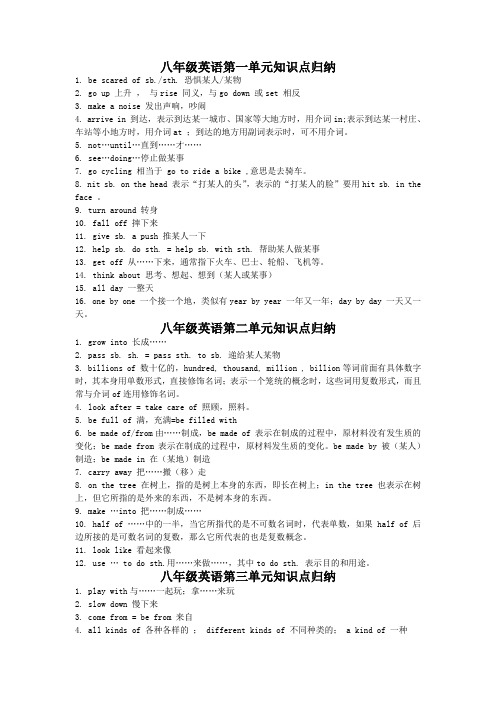
八年级英语第一单元知识点归纳1. be scared of sb./sth. 恐惧某人/某物2. go up 上升,与rise 同义,与go down 或set 相反3. make a noise 发出声响,吵闹4. arrive in 到达,表示到达某一城市、国家等大地方时,用介词in;表示到达某一村庄、车站等小地方时,用介词at ;到达的地方用副词表示时,可不用介词。
5. not…until…直到……才……6. see…doing…停止做某事7. go cycling 相当于 go to ride a bike ,意思是去骑车。
8. nit sb. on the head 表示“打某人的头”,表示的“打某人的脸”要用hit sb. in the face 。
9. turn around 转身10. fall off 摔下来11. give sb. a push 推某人一下12. help sb. do sth. = help sb. with sth. 帮助某人做某事13. get off 从……下来,通常指下火车、巴士、轮船、飞机等。
14. think about 思考、想起、想到(某人或某事)15. all day 一整天16. one by one 一个接一个地,类似有year by year 一年又一年;day by day 一天又一天。
八年级英语第二单元知识点归纳1. grow into 长成……2. pass sb. sh. = pass sth. to sb. 递给某人某物3. billions of 数十亿的,hundred, thousand, million , billion等词前面有具体数字时,其本身用单数形式,直接修饰名词;表示一个笼统的概念时,这些词用复数形式,而且常与介词of连用修饰名词。
4. look after = take care of 照顾,照料。
5. be full of 满,充满=be filled with6. be made of/from由……制成,be made of 表示在制成的过程中,原材料没有发生质的变化;be made from 表示在制成的过程中,原材料发生质的变化。
人教版英语八下知识点归纳

人教版英语八下知识点归纳
人教版英语八年级下册涉及的知识点包括语法、词汇、阅读理解、写作和听力等多个方面。
下面我将从这几个方面对知识点进行
归纳。
1. 语法,包括进行时态、一般过去时、现在完成时、情态动词、被动语态、虚拟语气等。
学生需要掌握这些时态的构成和用法,以
及情态动词的情态和用法,被动语态和虚拟语气的用法等。
2. 词汇,涉及动词短语、形容词和副词的比较级和最高级、固
定搭配、短语动词等。
学生需要掌握这些词汇的用法和搭配,以便
在阅读和写作中更准确地表达自己。
3. 阅读理解,包括阅读文章后的问题回答、根据所给信息进行
推断、判断正误等。
学生需要培养阅读理解能力,理解文章的主旨
和细节,从中获取信息并进行分析。
4. 写作,主要包括书面表达和口头表达,学生需要掌握一定的
写作技巧,包括如何组织语言、如何表达自己的观点和想法等。
5. 听力,学生需要通过听力练习来提高自己的听力水平,包括
听懂对话和短文,获取相关信息等。
总的来说,人教版英语八年级下册的知识点涵盖了语法、词汇、阅读理解、写作和听力等多个方面,学生需要全面掌握这些知识点,从而提高自己的英语综合能力。
希望以上内容能够帮助到你。
八年级下册人教版英语第二单元2d知识点

八年级下册人教版英语第二单元2d知识点英语作为一门重要的外语,在我们的学习生活中扮演了重要的角色。
对于初中生来说,学习英语是日常学习的重点之一。
八年级下册人教版英语第二单元2d知识点也是我们学习中的重头戏,掌握这些知识点对于我们的英语学习是至关重要的。
在本文中,我将和大家一起学习八年级下册人教版英语第二单元2d知识点,希望能对大家的英语学习有所帮助。
一、过去完成时的用法过去完成时表示在过去某个时间或动作之前已经发生了另一个动作或存在了一个状态。
它的结构是“had + 过去分词”,例如:“I had finished my homework before I went to bed.”二、虚拟语气的用法虚拟语气是表示一种假设、虚构或不可能实现的情况。
它的常用结构是:“if + 过去式,would/could/should + 动词原形;现在将来式”,例如:“If I had enough money, I would buy a car.”三、倒装语序英语中有很多种倒装语序,通常情况下是为了加强语气或者使语句更加清晰易懂。
例如:“Not only did he study En glish, but he also learned French.”四、固定搭配的用法英语中存在大量的固定搭配,掌握这些固定搭配对于我们的英语学习是非常有帮助的。
例如:“make friends”、“take part in”等。
五、情态动词的用法情态动词通常表示说话者的态度、意图、能力、推测等,它们有“can, could, may, might, must, shall, should, will, would”等。
例如:“I can swim very well.”总之,八年级下册人教版英语第二单元2d知识点是我们英语学习中的重点之一。
要想掌握这些知识点,我们需要抓住重点,勤加练习,多听多读多记多练,相信我们的英语水平一定会不断提高。
八年级英语人教版(新目标)(最新版)下学期期末复习一
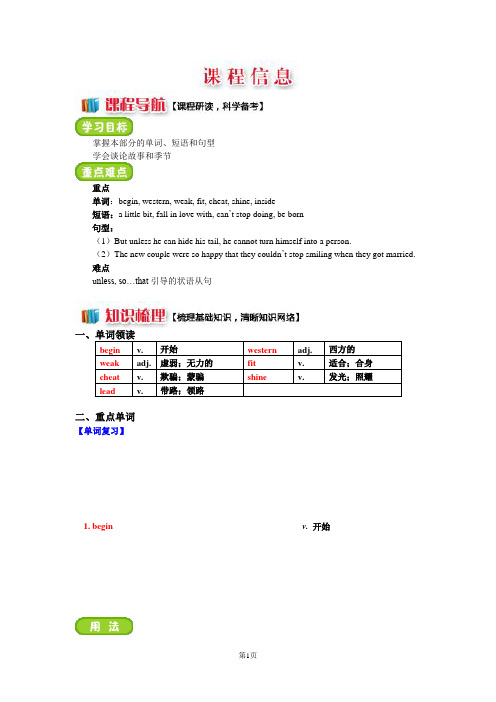
掌握本部分的单词、短语和句型学会谈论故事和季节重点单词:begin, western, weak, fit, cheat, shine, inside短语:a little bit, fall in love with, can’t stop doing, be born句型:(1)But unless he can hide his tail, he cannot turn himself into a person.(2)The new couple were so happy that they couldn’t stop smiling when they got married.难点u nless, so…that引导的状语从句begin v. 开始western adj. 西方的weak adj. 虚弱;无力的fit v. 适合;合身cheat v. 欺骗;蒙骗shine v. 发光;照耀lead v. 带路;领路二、重点单词【单词复习】1. begin v. 开始其过去式为began。
后面跟名词、动名词或动词不定式,接动名词和不定式无意义区别。
同义词是start。
When did he begin learning English? =When did he begin to learn English?他什么时候开始学英语的?begin with 以……开始beginning n. 开始,可构成短语:at the beginning of 在……之初Let’s begin the meeting with a happy song.让我们以一首欢快的歌曲开始会议。
At the beginning of this term, we made plans to study hard.在这学期之初,我们就制定了计划要努力学习。
My mother ____________ cooking half an hour ago.A. startsB. startingC. beginsD. began答案:D思路分析:根据half an hour ago可知时态用一般过去时。
人教版八年级英语下册各单元知识点汇总
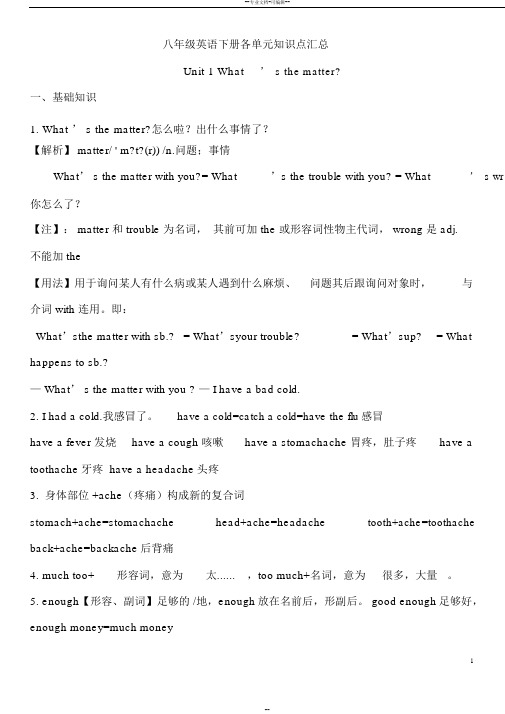
--专业文档-可编辑--八年级英语下册各单元知识点汇总Unit 1 What’ s the matter?一、基础知识1.What ’ s the matter?怎么啦?出什么事情了?【解析】 matter/ ' m?t?(r)) /n.问题;事情What’ s the matter with you?= What’s the trouble with you? = What’ s wr 你怎么了?【注】: matter 和 trouble 为名词,其前可加 the 或形容词性物主代词, wrong 是 adj.不能加 the【用法】用于询问某人有什么病或某人遇到什么麻烦、问题其后跟询问对象时,与介词 with 连用。
即:What’sthe matter with sb.? = What’syour trouble?= What’sup? = What happens to sb.?— What’ s the matter with you ? — I have a bad cold.2. I had a cold.我感冒了。
have a cold=catch a cold=have the flu感冒have a fever 发烧have a cough 咳嗽have a stomachache 胃疼,肚子疼have a toothache牙疼 have a headache头疼3.身体部位 +ache(疼痛)构成新的复合词stomach+ache=stomachache head+ache=headache tooth+ache=toothache back+ache=backache后背痛4. much too+形容词,意为太......,too much+名词,意为很多,大量。
5.enough【形容、副词】足够的 /地,enough放在名前后,形副后。
good enough足够好,enough money=much money6. lie down 躺下, lie 躺,躺着,过去式lay;lie 说谎,过去式 lied7. maybe 或―许‖,常用于句首,表示可能性,后加句子。
最新人教新目标英语八年级下全册知识点总结

人教新目标八年级下全册知识点总结八年级下Unit1---Unit3一.重点短语1.live to be 200 years old 活到200岁2.fall in love with3.be able to =cane true(无被动语态)= chieve5.in space 在太空中6.wake up7.over and over again8.on computers9.get bored10.argue with sb11.out of style12.write sb a letter=write to sb13.a ticket to 一张……的票14.on the phone / by phone15.get on well with sb16.have a fight with sb / fight with sbplain aboutpare…with19.pay for(it/them)20.the same age as21.on the one hand…on the other hand22.(all) by oneself=alone23.for the first time24.in history25.as…as possible = as…as sb can26.keep out不让……进入27.call the police28.answer the phone29.take off30.follow sb to do sth31.at that time32.hear about / hear of33.in silence 默默地34.take place / happen (无被动语态)35.one’s own +名词=名词+of one’s own二、考点归纳考点1.There be -------(将来时)There is/are going to be ( will be ) +名词。
2023年人教版八年级英语下册各单元知识要点梳理
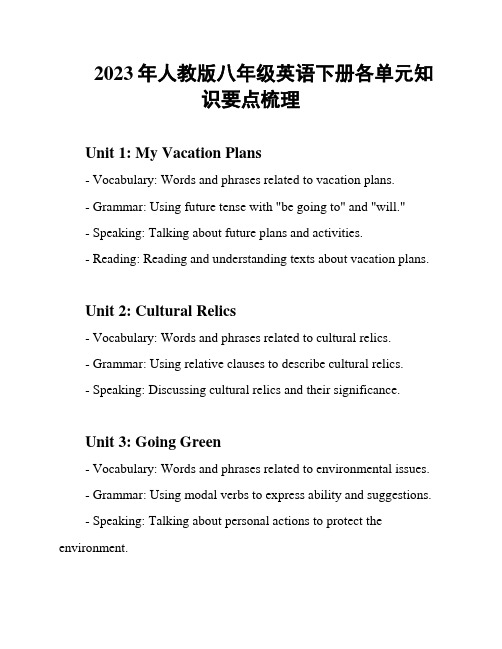
2023年人教版八年级英语下册各单元知识要点梳理Unit 1: My Vacation Plans- Vocabulary: Words and phrases related to vacation plans.- Grammar: Using future tense with "be going to" and "will."- Speaking: Talking about future plans and activities.- Reading: Reading and understanding texts about vacation plans.Unit 2: Cultural Relics- Vocabulary: Words and phrases related to cultural relics.- Grammar: Using relative clauses to describe cultural relics.- Speaking: Discussing cultural relics and their significance.Unit 3: Going Green- Vocabulary: Words and phrases related to environmental issues.- Grammar: Using modal verbs to express ability and suggestions.- Speaking: Talking about personal actions to protect the environment.- Reading: Reading and understanding texts about environmental initiatives.Unit 4: The Story of Silk- Vocabulary: Words and phrases related to silk and its production.- Grammar: Using the past simple tense to describe past events.- Speaking: Discussing the history and significance of silk.Unit 5: Traditional Festivals- Vocabulary: Words and phrases related to traditional festivals.- Grammar: Using adjectives to describe festivals.- Speaking: Talking about favorite festivals and reasons for celebration.- Reading: Reading and understanding texts about traditional festivals.Unit 6: Crime Scene Investigation- Vocabulary: Words and phrases related to crime and investigation.- Grammar: Using reporting verbs and reported speech.- Speaking: Discussing crime and police investigations.Unit 7: Sports and Health- Vocabulary: Words and phrases related to sports and health.- Speaking: Talking about favorite sports and health practices.- Reading: Reading and understanding texts about sports and health.Unit 8: Space Exploration- Vocabulary: Words and phrases related to space and exploration. - Grammar: Using passive voice to describe actions.- Speaking: Discussing space exploration and its significance.Unit 9: Managing Money- Vocabulary: Words and phrases related to money management.- Grammar: Using conditionals to express consequences.- Speaking: Talking about personal financial decisions.- Reading: Reading and understanding texts about managing money.Unit 10: The Power of Nature- Vocabulary: Words and phrases related to natural disasters.- Grammar: Using conjunctions to express cause and effect.- Speaking: Discussing natural disasters and their impact.。
人教版八年级下册英语单元知识点总结
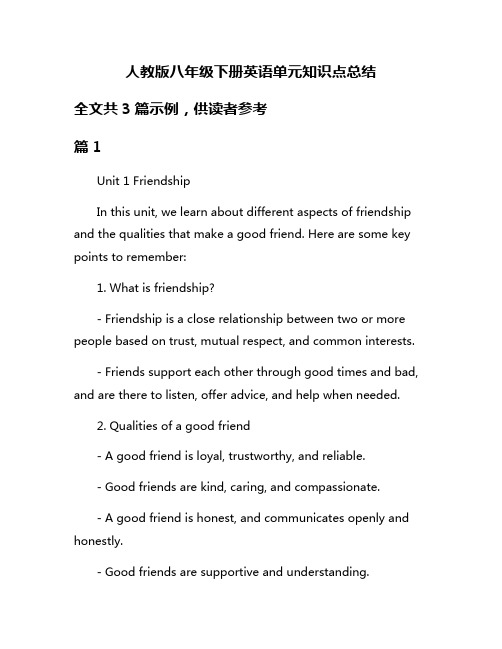
人教版八年级下册英语单元知识点总结全文共3篇示例,供读者参考篇1Unit 1 FriendshipIn this unit, we learn about different aspects of friendship and the qualities that make a good friend. Here are some key points to remember:1. What is friendship?- Friendship is a close relationship between two or more people based on trust, mutual respect, and common interests.- Friends support each other through good times and bad, and are there to listen, offer advice, and help when needed.2. Qualities of a good friend- A good friend is loyal, trustworthy, and reliable.- Good friends are kind, caring, and compassionate.- A good friend is honest, and communicates openly and honestly.- Good friends are supportive and understanding.- A good friend is respectful of your feelings, opinions, and boundaries.3. Building and maintaining friendships- Developing friendships takes time and effort. To build and maintain friendships, it's important to show interest in others, be a good listener, and be willing to compromise and forgive.- Communication is key in any relationship. Make sure to communicate openly and honestly with your friends, and listen to their thoughts and feelings as well.4. Types of friendships- There are different types of friendships, including casual friendships, close friendships, and best friendships.- Casual friendships are more surface-level, while close friendships involve a deeper level of trust and emotional connection.- Best friendships are the closest relationships we have, and involve a high level of trust, mutual respect, and understanding.5. Friends in different situations- Friends are there to support us in different situations, whether it's during happy times, sad times, or times of conflict.- It's important to be a good friend and support others when they need it, as well as ask for help and support when you need it.Overall, friendship is a valuable and important part of our lives. By understanding the qualities of a good friend, building and maintaining friendships, and being there for others in times of need, we can cultivate positive and fulfilling relationships with those around us.篇2Unit 1 Making New FriendsIn this unit, we learned how to make new friends and maintain positive relationships. Here are some key points that we covered:1. Introducing yourself: When meeting new people, it's important to introduce yourself politely. You can say "Hi, I'm (name)" or "Nice to meet you, I'm (name)."2. Asking questions: To get to know someone better, ask them questions about their interests, hobbies, and background. Some common questions include "What do you like to do in your free time?" or "Where are you from?"3. Finding common interests: Building a friendship is easier when you have common interests. Take the time to find out what activities you both enjoy and try to do them together.4. Being a good listener: Remember to listen actively when someone is talking to you. Show interest in what they're saying and ask follow-up questions to keep the conversation going.5. Being kind and respectful: Treat others with kindness and respect, even if you have differences of opinion. Being considerate and understanding will help build trust and strengthen your friendships.6. Resolving conflicts: Conflicts are a natural part of any relationship. When disagreements arise, try to communicate openly and find a compromise that works for both parties.Overall, making new friends is an important skill that will benefit you throughout your life. By following these key points, you can build strong and lasting friendships with others.Unit 2 Giving DirectionsIn this unit, we learned how to give and follow directions in English. Here are some important points to remember:1. Giving directions: When giving directions, use clear and simple language. Start with phrases like "Go straight" or "Turn left/right" to help the person understand where to go.2. Describing locations: Use prepositions like "on", "next to", "in front of", and "behind" to describe the location of places. For example, "The bank is next to the post office."3. Asking for directions: If you're lost and need help, don't be afraid to ask for directions. Use polite phrases like "Excuse me, can you tell me how to get to (place)?" to get the help you need.4. Using landmarks: When giving directions, include landmarks like buildings, parks, or shops to help the person easily identify the location.5. Following directions: When someone gives you directions, listen carefully and ask for clarification if needed. Repeat the instructions in your head to make sure you understand them.6. Giving detailed instructions: If the person needs more detailed directions, use specific terms like distances, street names, and directions (north, south, east, west).By practicing these skills, you'll become more confident in giving and following directions in English.Unit 3 Travel JournalIn this unit, we learned about different types of travel and how to write a travel journal. Here are some key points we covered:1. Types of travel: There are various ways to travel, including by plane, train, bus, car, boat, and on foot. Each type of travel offers a unique experience and opportunity to explore new places.2. Travel accommodations: When traveling, you may stay in hotels, hostels, guesthouses, or with friends and family. Choose accommodations that meet your needs and budget.3. Packing for travel: When packing for a trip, consider the weather, activities, and culture of the destination. Pack essential items like clothes, toiletries, documents, and money.4. Writing a travel journal: Keep a record of your travel experiences by writing a travel journal. Include details like the date, location, activities, people you meet, and your thoughts and feelings.5. Sharing travel experiences: Share your travel experiences with others through photos, videos, blogs, or social media. Invite friends and family to join you on future trips or explore new destinations together.6. Learning from travel: Traveling allows you to learn about different cultures, languages, and customs. Embrace new experiences, try local foods, and connect with people from around the world.By keeping a travel journal and reflecting on your experiences, you can make the most of your travels and create lasting memories.Unit 4 Traditions and CultureIn this unit, we explored different traditions and cultures around the world. Here are some key points we discussed:1. Cultural diversity: The world is home to diverse cultures, each with its own traditions, customs, and beliefs. By learning about different cultures, we gain a better understanding and appreciation of the world around us.2. Traditional celebrations: Many cultures have unique ways of celebrating holidays and special events. These traditions can include festivals, ceremonies, rituals, and performances that bring communities together.3. Cultural exchange: Through cultural exchange programs, people can learn about and experience other cultures firsthand.This can help foster mutual respect, understanding, and friendship between individuals from different backgrounds.4. Preserving traditions: It's important to respect and preserve traditional customs and practices that have been passed down through generations. By participating in cultural events and activities, we can help keep these traditions alive.5. Cultural differences: While exploring new cultures, it's important to be open-minded and respectful of different beliefs and practices. Embrace the diversity you encounter and be willing to learn from others.6. Celebrating diversity: By celebrating the traditions and cultures of others, we can promote unity, harmony, and peace in our communities and across the globe.By appreciating and respecting cultural diversity, we can create a more inclusive and harmonious world for all. Take the time to learn about different traditions and cultures, and embrace the richness and beauty they bring to our society.Unit 5 Science and TechnologyIn this unit, we delved into the world of science and technology and their impact on our daily lives. Here are some key points we covered:1. Scientific discoveries: Science has led to many groundbreaking discoveries and advancements in fields like medicine, technology, engineering, and space exploration. These innovations continue to improve our quality of life and expand our knowledge of the world.2. Technology in society: Technology plays a crucial role in modern society, shaping how we communicate, work, learn, and entertain ourselves. From smartphones and computers to artificial intelligence and virtual reality, technology has revolutionized the way we live.3. Environmental sustainability: Science and technology also play a key role in addressing environmental issues and promoting sustainability. Renewable energy sources, green technologies, and conservation efforts help protect our planet and ensure a cleaner, healthier future for generations to come.4. Digital literacy: In today's digital age, it's important to be literate in technology and understand how to navigate digital platforms, use online resources, and protect your personal information. Develop your digital skills to stay informed and connected in a rapidly changing world.5. Science education: Encourage a passion for science and technology by engaging in hands-on experiments, STEMactivities, and educational programs. Explore the wonders of the natural world and inspire curiosity and creativity in future generations of scientists and innovators.6. Ethical considerations: As science and technology continue to advance, it's important to consider the ethical implications of new discoveries and technologies. Be mindful of the impact of scientific research and innovation on society, the environment, and future generations.By embracing the possibilities of science and technology and staying informed about their impact on our world, we can harness the power of innovation to create a better future for all. Stay curious, explore new ideas, and use technology responsibly to make a positive difference in the world.Overall, the eight grade English curriculum covers a wide range of topics that are essential for students' personal and academic development. By mastering these key points, students can improve their language skills, cultural awareness, and critical thinking abilities, setting a strong foundation for success in their academic and professional pursuits. Keep practicing, learning, and growing in your English studies, and you'll be well-prepared for whatever challenges and opportunities lie ahead. Good luck!篇3Unit 1 Making New Friends1. Introduce yourself- Hi, I’m… / My name is…- I’m from…- I like/love/enjoy…- I’m good at…2. Ask someone about their interests- What do you like doing in your free time?- Do you play any sports or musical instruments?- Which subjects do you like at school?3. Expressing likes and dislikes- I love/like/enjoy…- I hate/don’t like…- I’m not very keen on…4. Making plans- Would you like to…?- How about…?- Let’s…Unit 2 My Day1. Talking about daily routines- I get up at…- I have breakfast/lunch/dinner at…- I go to school/work at…- I come home at…- I go to bed at…2. Time expressions- In the morning/afternoon/evening - At night- At (7 o’clock)3. Using the present simple tense - He gets up at 7 o’clock.- She eats breakfast at 8 o’clock. - They go to school at 9 o’clock.Unit 3 What are you doing for vacation?1. Talking about vacation plans- I’m going to…- I’m planning to…- We’re going to…2. Asking for and giving opinions- What do you think of…?- How do you feel about…?- I think it’s great because…3. Using the future tense- I will go to the beach.- She is going to visit her grandparents. - They are planning to go hiking.Unit 4 What’s the best movie theater?1. Describing places- There is/are…- It’s (adjective) and (adjective).- The (place) is located in (location).2. Comparing places- The movie theater is better than the theater.- The park is not as big as the zoo.- The library is the best place for studying.3. Giving reasons and opinions- I prefer the mall because it has more shops.- The park is my favorite place because it’s peaceful. - I think the museum is the most interesting place. Unit 5 Do you want to watch a game show?1. Talking about TV programs- I like watching…- My favorite TV program is…- I usu ally watch…2. Making suggestions- How about watching a movie?- Let’s go to a concert.- Why don’t we play video games?3. Using imperatives- Please turn on the TV.- Don’t change the channel.- Let’s watch the news at 6.Unit 6 I’m more outgoing than my sister.1. Comparing people- My brother is taller than my sister.- Lisa is more intelligent than Tom.- Mike is the funniest person in our class.2. Superlatives- This is the biggest building in the city.- Lisa is the smartest student in the school.- It’s the most interesting book I’ve ever read.3. Expressing preferences- I prefer action movies to romantic movies.- I like dancing more than singing.- I enjoy playing basketball the most.Unit 7 How do you make a banana milk shake?1. Describing recipes- First, you need to…- Next, you should…- Finally, you can…2. Giving instructions- You should peel the bananas.- Then you blend the bananas and milk.- Add some sugar and ice cubes to taste.3. Asking for and giving advice- Can you give me some advice on making cookies?- Sure, don’t forget to preheat the oven.- My advice is to add a pinch of salt for flavor.Unit 8 It must belong to Carla.1. Making deductions- It must be Carla’s bag because it has her name on it.- It can’t be Peter’s pencil because he always uses a red one.- It might belong to Lisa since she loves the color purple.2. Using modal verbs for deduction- She must have forgotten her keys.- They can’t be at the park because it’s raining.- It might be in the kitchen, check there.3. Possessive pronouns- That book is mine, not yours.- Is this umbrella yours or mine?- This pen belongs to him, not her.This summarizes the key points covered in the 8th-grade English textbook. Remember to review and practice these points to improve your English skills. Good luck!。
- 1、下载文档前请自行甄别文档内容的完整性,平台不提供额外的编辑、内容补充、找答案等附加服务。
- 2、"仅部分预览"的文档,不可在线预览部分如存在完整性等问题,可反馈申请退款(可完整预览的文档不适用该条件!)。
- 3、如文档侵犯您的权益,请联系客服反馈,我们会尽快为您处理(人工客服工作时间:9:00-18:30)。
新人教版八年级英语下册知识点2017最新版wordUnit 1. what’s the matter?一.重点短语归纳1. foot---feet 脚 <复> tooth---teeth 牙齿 <复>2. have a cold 感冒3. have a stomachache 胃疼4. have a sore back背疼5. have a sore throat喉咙疼6. have a fever发烧7. lie down and (have a)rest 躺下休息have a rest 休息8. hot tea with honey 加蜜的热茶9. see a dentist 看牙医see a doctor 看医生10.drink lots of water多喝水11.lots of ,a lot of, 许多。
大量a lot of=lots of,可以修饰可数名词复数和不可数名词,一般用在肯定句中。
:There are lots of (a lot of)books in our library.There is a lot of water on the grounda lot,是一个副词词组,跟动词连用;表示十分,很等意思;Thanks a lot.12. have a toothache牙疼13. That’s a good idea好主意14. go to bed 去睡觉go to bed early 早上床睡觉15. feel well感到好 feel ill 感到不舒服I don’t feel well= I’m not feeling well 我感觉不舒服.16. start doing/ to do sth开始做某事(to do 是一件事情完成了,开始做另外一件事情doing是原来的那件事情做到一半,现在又开始做了,是同一件事情。
)17. two days ago两天前18. get some rest 多休息, 休息一会儿19. I think so我认为是这样20. be thirsty口渴 21. be hungry 饥饿22. be stressed out紧张23. listen to music听音乐24. healthy lifestyle健康的生活方式25. traditional Chinese doctors传统中医26. need to do sth 需要做某事I have a toothache. I need to see a dentist. 我牙痛, 我需要去看牙医.We need to keep our classroom clean. 我们需要保持教室的干净.27. too much + 不可数名词太多的…much too +形/副实在太…极其,非常too many + 可数名词复数太多的…28.be good for sth./ doing sth.对什么有益,对什么有好处be bad for sth./ doing sth.对什么有害be good to 对…好be good at =do well in 在……方面好,擅长be good(bad) for、be good at的相关用法1.be good for 对......有益Doing morning exercises is good for your health.做早操对你们的建康有益。
2.be good at 擅长于......Li Ping is good at basketball.李平擅长于篮球。
= Li Ping is good at playing basketball.李平擅长于打篮球。
be good at = do well in 如:I'm good at math. = I do well in math.我擅长于数学。
3.be good to 对......好Parents are always good to their children.父母亲总是对他们的孩子好。
29.get good grades 取得好成绩30.angry 用法be angry with sb生某人的气I was angry with him for keeping me waiting.我对他很生气,因为他让我等了好久。
be angry at/ about sth 就某事生气31.It’s easy to do sth做某事是容易的。
It’s important to do sth . 做某事很重要。
32.balanced diet平衡饮食33.get tired 感到疲倦be/get tired34.stay healthy 保持健康=keep healthy=keep in good health35.He shouldn’t eat anything=He should eat nothing.他不应当吃任何东西.36.give sb some advice给某人建议give advice 提出建议advice 是不可数名词a piece of advice 一则建议take one’s advice 采纳或听从某人的建议He gave me some good advice.他向我提了一些很好的意见。
49.sleep 8 hours a night每晚睡眠八小时,get enough sleep 得到充足的睡眠50.take medicine 吃药服药I have to take medicine three times a day for my cold.因为感冒,我不得不一天吃三次药。
二固定结构It’s +形容词+ for sb. + to do sth.做某事对某人来说是…的。
It’s important to do sth .做某事很重要。
It’s important for me to eat a balanced diet.平衡饮食对我来说是很重要的.It’s easy to do sth做某事是容易的。
It’s easy for us to find out the answer.找出答案对我们来说是容易的三.重点句子1.What’s the matter ? What’s the mater with you ? 你怎么啦?=What’s the trouble with you?=What’s wrong with you?I have a cold / have a sore back / have a stomachache2.That’s too bad. You should / shouldn’t…那太糟糕了. 你应该/不该…You should lie down and rest / drink hot tea with honey / see a dentist / see a doctor .He shouldn’t eat anything = He should eat nothing.他不应当吃任何东西.3.I’m not felling well . 这里well表示身体状况,不能用good代替I don’t feel well= I’m not feeling well 我感觉不舒服.4.When did it start ? About two days ago . 什么时候开始的?大约两天前5.I hope you fell better soon . 我希望你很快好起来这里better是well的比较级10.It’s easy to have a healthy lifestyle ,and it’s important to eat a balanced d iet .有一个健康的生活方式很容易,饮食平衡是很重要的。
→ It’s easy to do sth . 做某事容易/ It’s important to do sth . 做某事重要四.知识结构○1.情态动词should的用法should是情态动词,它的基本用法是必须和其他动词一起构成谓语。
情态动词没有人称和数的变化,意为"应该......"。
should(应当,应该)用于所有人称,表示劝告或建议。
eg. You should wait a little more.你应该再多等一会儿。
--- I have a very bad cold.我感冒很厉害。
--- You should lie down and have a rest.你应该躺下,多喝水。
○2maybe与may be1.maybe是副词,译为“也许、可能”,相当于“perhaps”。
如:Maybe he can answer the question.也许他能回答那个问题。
He maybe is from the USA, too. 他可能也来自美国。
2.may be中的may为情态动词,译为“可能是......”。
如:He may be from the USA, too.他可能也来自美国。
She may be our English teacher.她可能是我们的英语老师○4few、a few、little、a little的区别和联系:1.few / a few用来修饰可数名词,few表示否定意义,没有,几乎没有;a few表示有肯定意思,有几个。
例如:He has few friends here, he feels lonely. 他这里没朋友,他感觉寂寞。
There are a few eggs in the basket.篮子里有几个鸡蛋。
2.little / a little用来修饰不可数名词,little表示否定意思,没有,几乎没有。
a little 表示肯定意思,有一点儿。
例如:There is little ink in my bottle, can you give me a little ink?我的瓶子里没有墨水了,你能给我点儿墨水吗?3 not…until直到…(否定句) 才,动词为短暂性或瞬间性动词She didn’t leave until we came.He went shopping after he got up.=He didn’t go shopping until /before he got up.……until/till直到···(肯定句)动词为延续性动词We stayed here till/until 12 o’clock.Unit 2 I'll help clean the city parks.一.知识点:短语动词小结常见短语动词结构有下面几种:1.动词+副词如:give up 放弃turn off 关掉stay up 熬夜这种结构有时相当于及物动词,如果其宾语是代词,就必须放在动词和副词之间,如果是名词,则既可插在动词和副词之间,也可放在短语动词后。
